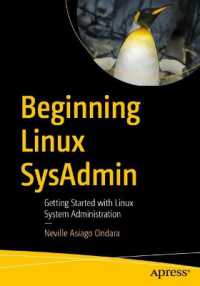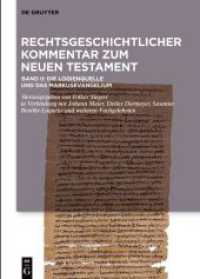基本説明
New in paperback. Hardcover was published in 2008. From the Contents: Part I: Ab Originem: L.L. Cavalli-Sforza: Genetic Evolution and the Evolution of Languages. Bernard Comrie: Languages, Genes and Prehistory, with Speicial Reference to Europe. Frederick J. Newmeyer: Conceptualization, Communication, and the Origins of Grammar. Gilles Fauconnier and Mark Turmel: The Origin of Language As a Product of the Evolution of Modern Cognition. Part II: Post Originem: Bernard Laks: Genetics and Language: Comparatism and Genealogy in Perspective. Jean-Paul Demoule: On Renfrew's Hypothesis of the Near-Eastern Origins of the Indo-European Urheimat. Salikoko S. Mufwene; What Do Creoles and Pidgins Tell Us About the Evolution of Languages? Serge Cleuziou; Linguistics and Achaelogy.
Full Description
"Origin and Evolution of Languages" has a strong interdisciplinary flavour designed to highlight the true complexity of the debates in the field. Many of the models and theories conjectured can only receive their validation from a convergence of arguments developed across disciplines. The book underscores this dimension by including contribution from disciplines that have been wary, traditionally, of extending beyond their borders: linguistics (different branches thereof), philosophy, history and prehistory, archaeology, anthropology, genetics, computer-modelling. The presentation is intended to encompass both the agreements and disjunctures characteristic of the field and insisted on laying open propositions that clearly differ from, possibly even enter into contradiction with one another. While several teams of researchers active in the fields of genetics, linguistics, anthropology and archaeology have come up with new proposals in favor of the "New Synthesis," many competing hypotheses and models continue to be explored in areal linguistics, language contact, wave-like diffusion.
On the anthropological scene, criticisms of the monogenetic model have set up new debates and counter-arguments. Approaching the issue of the origin and evolution of human languages within a Darwinian paradigm remains problematic. On the archaeological scene, not all reconstructions are proving compatible with current models for the circulation of techniques, myths and cultures. On the linguistic scene, raising again the issue of the origin/evolution of humankind and of languages in an evolutionary, cognitive, social and cultural perspective or in terms of generational transmission and acquisition, may induce a reconsideration of linguistic theories in search of universals as well as most theories of change and variation. All contributors are world-renowned experts in their domain.
Contents
INTRODUCTION SERGE CLEUZIOU (CNRS), Jean Paul Demoule (University of Paris 1), Pierre Encreve (EHESS), Bernard Laks (University of Paris 10) Part One : ab originem GENETIC EVOLUTION AND THE EVOLUTION OF LANGUAGES. L.L.Cavalli-Sforza, Genetics Dept. Stanford University LANGUAGES, GENES, AND PREHISTORY, WITH SPECIAL REFERENCE TO EUROPE. Bernard Comrie, Max Planck Institute for Evolutionary Anthropology, and University of California Santa Barbara POOR DESIGN FEATURES IN LANGUAGE AS CLUES TO ITS PREHISTORY.Andrew Carstairs-McCarthy, Linguistics, University of Canterbury, New Zealand. WHAT CAN WE LEARN ABOUT THE EARLIEST HUMAN LANGUAGE BY COMPARING LANGUAGES KNOWN TODAY? Lyle Campbell, Linguistics, University of Canterbury, New Zealand CONCEPTUALIZATION, COMMUNICATION, AND THE ORIGINS OF GRAMMAR. Frederick J. Newmeyer University of Washington THE ORIGIN OF LANGUAGE AS A PRODUCT OF THE EVOLUTION OF MODERN COGNITION Gilles Fauconnier and Mark Turner, University of California San Diego and Case University Part Two : post originem GENETICS AND LANGUAGE: COMPARATISM AND GENEALOGY IN PERSPECTIVE. Bernard Laks, University of Paris 10 SIMULATING THE EXPANSION OF FARMING AND THE DIFFERENTIATION OF EUROPEAN LANGUAGES.Domenico Parisi, Francesco Antinucci, Francesco Natale, Federico Cecconi, Institute of Cognitive Sciences and Technologies, Italian National Research Council ON RENFREW'S HYPOTHESIS OF THE NEAR-EASTERN ORIGINS OF THE INDO-EUROPEAN URHEIMAT Jean-Paul Demoule, University of Paris 1 NEW PERSPECTIVES ON THE ORIGIN OF LANGUAGES Merrit Ruhlen Stanford University LINGUISTIC HISTORY AND COMPUTATIONAL CLADISTICS Don Ringe and Tandy Warnow, University of Pennsylvania and University of Texas WHAT DO CREOLES AND PIDGINS TELL US ABOUT THE EVOLUTION OF LANGUAGES? Salikoko S. Mufwene University of Chicago LINGUISTICS AND ARCHEOLOGY.Serge Cleuziou University Paris 1








